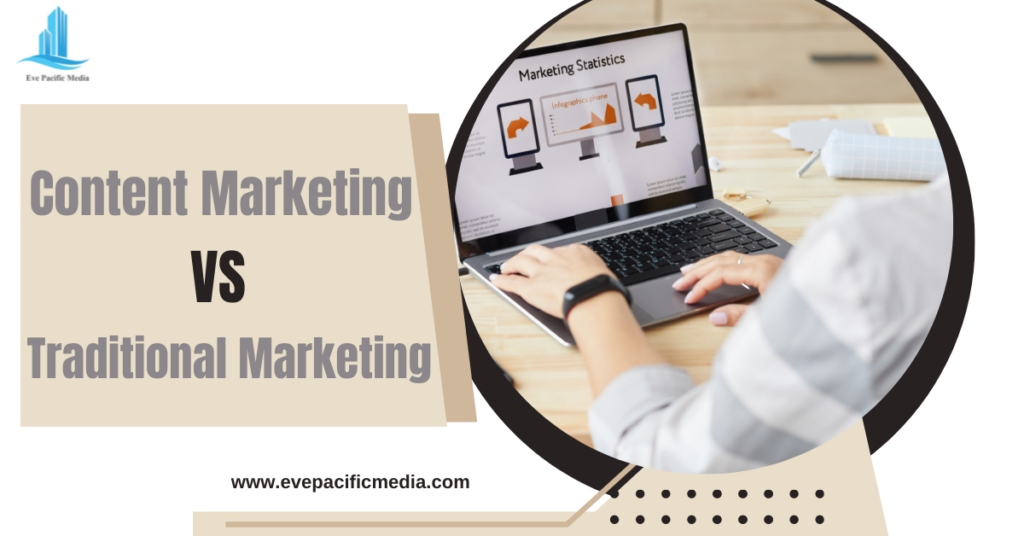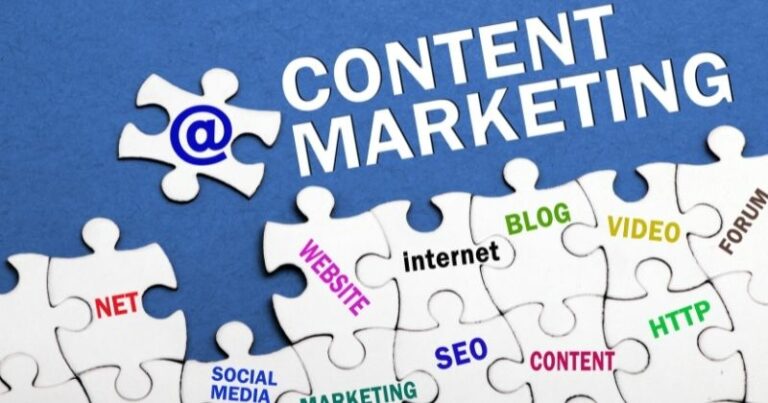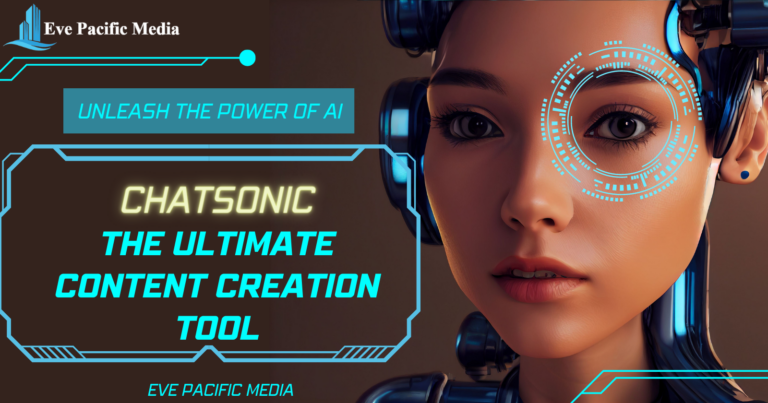Content Marketing vs Traditional Marketing
Do you want to reach your target audience and communicate the benefits of your product and service? Are you willing to successfully acquire, keep, and grow customers? If this is the case, your marketing goals must relate to the specific business objectives your company wants to achieve. The question is, Content Marketing vs Traditional Marketing, which is best for you?

There is so much information on the internet that we’ve done all the research for you here! Some companies, especially those that have relied primarily on more traditional marketing strategies, could first find it difficult to differentiate between content marketing and traditional marketing. After all, content marketing is just as common as other types of marketing for promoting a product or service.
So, what is so different about content marketing from traditional marketing, and which is best for you? Read on to find the mystery of Traditional Marketing vs Content Marketing.
What is content marketing?
Content marketing involves Creating materials like blog posts, white papers, videos, articles, and infographics to get people interested in a brand without promoting it directly. The Content Marketing Institute refers to it as “Non-Interruptive marketing.”
Although blogs and SEO have been the primary emphasis of modern content marketing, any effort to attract a target audience by providing them with useful content is content marketing. A business blog is often the main hub of information for a company’s website. When they publish new content, they also promote it by sharing links on various social media platforms.
In addition, they implement search engine optimization (SEO) techniques to improve the visibility of their content in the eyes of their potential audience. In contrast to traditional marketing methods, content marketing focuses on providing useful information to your target audience.
The idea is that providing valuable content will earn the reader’s trust. They’ll continue to engage with your work and, ultimately, sign up for your email list in exchange for an offer (such as a newsletter or a free downloadable eBook). Your brand’s visibility and credibility will rise in proportion to the quantity and quality of content you publish there.
Building trust in your brand is essential if you want to get customers’ private details. The more information you have on a potential customer, the more effectively you can nurture them as a lead through targeted email communications. Because of this, content marketing is usually considered to be a long-term strategy.
You may also love to read my article: How Content Marketing Drives Sales
Advantages of content marketing
Content helps people with education, onboarding, training, and support. It saves time and money by answering customer questions without using up customer service resources. In the same way, it can help answer common sales questions, which frees up salespeople’s time. According to the 2021 Content Preferences Survey, 47% of buyers look at between three and five pieces of content before getting in touch with a salesperson.
Through established relationships, content marketing aims to increase revenue by attracting and retaining a target audience.
Read my article: Why is Content Marketing Important?
Pros:
- Content Marketing is quite simple.
- Content marketing aims to establish a relationship with the target audience by giving them useful content that might help them solve a problem or meet a need.
- Many affiliate marketing sites use content marketing to get people to find them through search engines so they can make money.
- It builds authority.
- It is possible to get a big picture with Content Marketing.
- Support your other marketing tactics as good content is essential for the success of many other marketing tactics.
- It has a compound effect.
- It creates assets that last.
- It helps you reach the right audience – even those who reject advertising.
- It helps you achieve better results and is cost-efficient.
- Increase traffic and conversions.
Disadvantages of content marketing
Let’s discuss some cons of content marketing.
Cons
- It has a high learning curve and can initially seem intimidating and confusing.
- It’s challenging with a small staff and costly to outsource.
- It can be challenging to manage.
- It’s more of an investment than something you can reap quickly.
- It may be pricey, especially for media such as videos and podcasts.
- In today’s cutthroat marketplace, it still requires publicity and may benefit from some paid promotion.
What is traditional marketing?
Traditional marketers show people information about what they’re trying to sell, even if they haven’t asked to see it. These advertisements have the potential to reach a wide audience, but they need a substantial investment.
Traditional marketing enables you to reach clients even if they aren’t actively searching for what you’re offering. In addition, there are a variety of other common approaches, like telemarketing, broadcasting, face-to-face meetings, and networking.
It is the process of creating a marketing message and sending it to a target audience through channels like TV, radio, print, and direct mail.
Advertising on a national cable channel during prime time or on the back of a magazine with a large subscriber base are two examples of classic marketing channels that larger companies can afford to take advantage of.
This type of marketing is known as “Interruptive” because it forces customers to see ads for products or services at unwanted times and places.
Traditional marketing has changed as a result of technological advancements. Nowadays, “Outbound” techniques such as social media advertising (particularly Facebook ads), YouTube commercials, advertisements on streaming services, sponsored marketing, and so on can be seen as branches of traditional marketing.
Good examples of traditional marketing include:
- Running a tv commercial.
- Placing ads on Facebook.
- Some types of influencer marketing.
- Buying radio ads.
- Pulling a banner during a large event or gathering of potential customers.
Advantages of Traditional Marketing
Traditional marketing has a much shorter life span and is usually a one-time effort to market products or services to a specific target audience. Here are some pros of Traditional Marketing;
Pros
- It connects you with your Local Audience.
- Traditional Marketing helps you build credibility.
- It contains promotional materials that are reusable and recyclable.
- You can appeal to a diverse Audience.
- Traditional marketing poses less potential risk for your brand.
- It is better at reaching certain audiences.
- It is better able to deliver specific offers for specific people.
- Traditional Medium is familiar and undertakable.
Disadvantages of Traditional Marketing
Here are some of the main disadvantages of traditional marketing:
Cons
- It is the less informative medium of marketing.
- Traditional marketing is losing Interest day by day.
- Traditional marketing offers DIY options.
- It can take longer to execute and refine than digital campaigns.
- It is gradually losing its audience.
- It doesn’t have the same ability to target and sub-segment as digital.
Content Marketing vs Traditional Marketing: What’s The Difference?
Content vs Traditional Marketing – Companies use these marketing methods when they produce informative content to lure new clients. Numerous sources are available for this, such as blogs, videos, postcards, quizzes, and email newsletters.
Its goal is to make potential clients’ lives better in some way, hoping they would come to value your company’s existence and stick with it. Let’s discuss Content vs Traditional Marketing.
| Content Marketing | Traditional Marketing |
| It is a way of marketing that involves Creating materials like blog posts, white papers, videos, articles, and infographics to get people interested in a brand without promoting it directly. | Traditional marketers show people information about what they’re trying to sell, even if they haven’t asked to see it. |
| The Content Marketing Institute refers to it as “non-interruptive marketing.“ | This type of marketing is known as “interruptive” because it forces customers to see ads for products or services at unwanted times and places. |
| Content marketing is the art of conversing with potential customers without trying to sell them anything. | These advertisements have the potential to reach a wide audience, but they need a substantial investment. |
| Its main focus is on creating quality content. | It focuses on buying advertising space, pushing a message on social media, renting space on billboards, or making expensive deals with sponsors. |
| It is a slower and more thoughtful process. | It’s more about reaching a wide range of potential customers quickly. |
| This opens the door for more direct marketing, promotional, and educational materials to be mailed out, as well as brand awareness and educational programs. | For a content strategy to work, the content must be valuable, interesting, and useful. |
| Content marketing gradually converts casual site visitors into loyal brand customers using a long-term, SEO-driven strategy. | Traditional marketing has a much shorter life span and is usually a one-time effort to market products or services to a specific target audience. |
Conclusion: Traditional Marketing vs Content Marketing
In conclusion, Traditional marketing and content marketing are distinct methods of marketing. Traditional marketing focuses on delivering a message through digital media to as many people as possible. Still, content marketing is all about providing excellent material that attracts and engages your target audience.
When comparing the two, content marketing is the more cost-effective option because it can be used as both a short-term and long-term plan. Your marketing campaigns will be able to run for longer, resulting in more brand awareness, website traffic, and ultimately, leads to paying customers. You can get much more bang for your buck with content marketing, even on a tight budget.
With traditional marketing, you either get the customer to buy right away or don’t. For this reason, once a traditional marketing campaign ends, it is typically not repeated.
When looking at content marketing vs traditional marketing, I agree that making a distinction is the proper move. Which method will help your company the most? The solution is dependent on your available budget and your goals.
Content marketing may be more fruitful than traditional advertising techniques in the long run since it helps you establish a stronger connection with your target audience and generates leads through creeks and streams.







